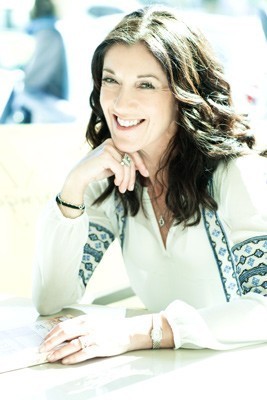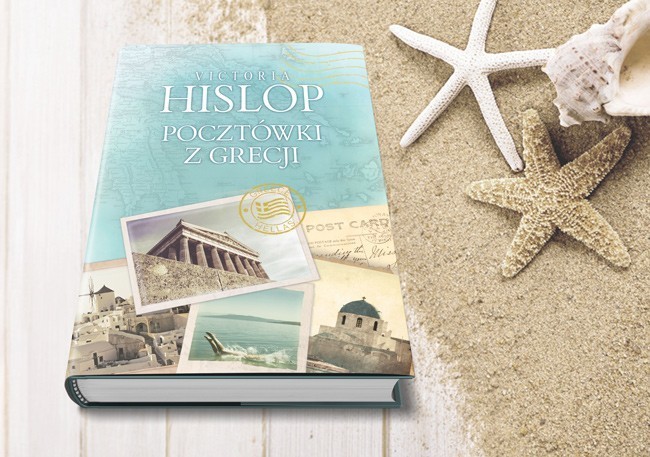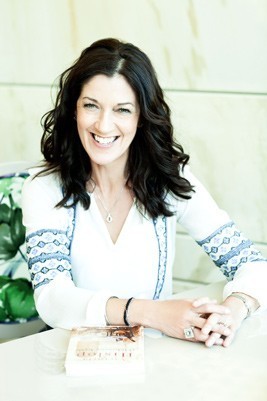Victoria Hislop about herself, about Greece and about postcards
Victoria Hislop about herself, about Greece and about postcards

I invite you to read the interview, as well as constantly to read the "Postcards from Greece", because "greeting cards from Greece" is a journey through Greece, which is worth to take place.
Beata betas Kuczborska: The first of the issued in Poland, and a novel by the Lady with Greece in the background, was set in Crete and Spinalondze, the second: in Thessaloniki. What caused the choice of places? Is there a story that relates to those places, or is there any personal experience or taste?
Victoria Hislop: These places inspired me, natchnęły when I visited them. These first "visits" were random – I didn't know what effect they had, but then I felt that they were an inspiration to me and that they would become something important in my life. Both of these places: and Spinalonga, and Thessaloniki, are full of history – so overflowing with this story that you can almost feel it walking tamtejszymi the paths.
Beata Kuczborska: Poczytna "Island" activated in Poland in my opinion and popularized about Spinalongi as a place to which to be exported to the sick leprosy: I dare say that before the release and huge success of "the Island", O Spinalondze heard in Poland Few, and today hundreds of people vacationing annually in Crete want to visit also Spinalongę. Do you like your feelings if you think about the British? Was this show of the island the reason for the novel, and did you expect this effect?
Victoria Hislop: When I wrote "The island" I had no idea that the novel would become such a poczytna, and even more so, that the disputes of such a popularity of the island of Spinalonga. But I was hoping that someone would like to make a novel and sell a few copies–the success was a surprise and a big surprise also! When I was looking for a British publisher willing to spend an "island" it turned out that this is not so simple and that there is simply no takers. It was not really that easy: the subject, which is the fate of lepers, did not seem to be a sought or commercial topic – rather, quite the opposite. But there was something in this story that interested people, which somehow influenced them: perhaps because it is a story about isolation and survival, with a happy ending. The island of Spinalonga now actually attracts the crowds of tourists of all nationalities who have read this novel – for me today it would be difficult to sail there again. The history and past are still alive, and I hope that all those who visit Spinalongę will feel it.
Beata betas Kuczborska: You have the perfect clerical workshop: Reading the novel is a huge pleasure. Where did this lady trained?
Victoria Hislop: Oh, you are a very nice lady! I suspect I have a fantastic translator – a big thank you to him! If it were different, don't usłyszałabym the compliment! I studied English literature at the University of Oxford, but it was a time when the literary works were deconstructed, which was the opposite of creation. But I suppose that because I read a lot and pasjonowały me different styles, and my vocabulary was very rich–when I was ready to write, I had a lot of tools I could use on my side. But the most important thing for me was "telling a story" in a simple, accessible and nieudziwniony way. I do not want to prove that Wymądrzam-just convey a certain idea, a certain history.
Beata Kuczborska betas: How did you become a writer? Did this case have you made your dream come true?
Victoria Hislop: I always liked to write and before I wrote the first novel-I was a journalist. I never really planned to write a novel – that's what happened, I surprised myself! I love writing something that's fictitious – it's very exciting for me!
Beata Kuczborska betas: I read in an interview with Mrs. that Mrs. Love for Greece began with her first trip to Athens together with her mother and sister when she was a teenager. What did you feel the most impressive and what is your favorite place in Athens?
Victoria Hislop: Yes, that's right. The first time I went to Athens when I was 16 or 17 years old and I was very pleased. I fell in love with the Light and the sun: There are so many sunny days, I fell in love with warmth, in people, in culture and Greek cuisine-in everything! My favorite place in Athens is the Acropolis Museum – an inspiring project, full of some of the most beautiful artifacts in the world.
Beata betas Kuczborska: Mrs. Second house is located on Crete. How did Greece influence your life? Has it changed something? Or maybe something learned?
Victoria Hislop: In Crete I feel happy – I find some special energy and extraordinary beauty. Has this thing changed in my life? I'm not sure so to the end, but I know I feel really like at home like in my house. I always meet wise, valuable people, people who live in a specific way, not like in a city with a constant rush and bustle. Here everything is perceived differently, for example, there feels strong relationships with nature, and the feeling of this has lost most of the people living in the UK.
Beata Kuczborska betas: What do you most like in Greeks? What do you like most about them?
Victoria Hislop: Most Greeks live the moment, many of them do not know what will bring tomorrow. They live in the present. It is not some particularly hedonistyczna attitude, but the recognition that our bottoms are to be lived and that you should just enjoy them.
Beata Kuczborska betas: Is there anything that you feel, European countries can learn from Greece?
Victoria Hislop: The family is very important to the Greeks-they all live close together, often even and Trzypokoleniowo. It helps people to survive those difficult times in which they live: they share everything they have. I think this is a good and correct model – in the UK, members of the family often reside in the distance of hundreds of miles away, so they don't really know each other, they don't know their needs, and there is no support structure when it happens Something bad. As a model of society – what we see in Greece may seem quite old-fashioned, but it has its advantages.
Beata Kuczborska betas: It is Mrs. Mother of two children. Do they, like you, are fascinated by Greece? Do you learn Greek? How do they adopt how they assess this relationship with Greece and does it affect their lives?
Victoria Hislop: My children today are 24 and 26 years old – chadzają their paths, but hopefully Greece will always be part of their lives. Both Greece love and visit it whenever they can. They both strongly understand more Greek than they can speak greekly, but with the son I can speak in this language even though, unlike me, I never get a Greek he taught. Crete is for them full of happy memories, and I firmly believe that these happy memories will both create still.
Beata Kuczborska betas: Imagine that according to the readership report in Poland in 2016, 63% of the population did not read any book. What is the situation in the UK and what can be done to encourage people to read?
Victoria Hislop: I don't know such estimates if we think of the UK, but I know that 16% of adult Brits are considered illiterate, which means reading and writing at a lower level than expected from Jedenastolatków. It's scary! We have a Great Britain organization called "The Literacy Trust," which does a really great deal to encourage children to read (because since reading everything starts), which provides many books to the prisoner (many convicted it also Illiterate) and which seems such a simple book that help to read this adult, for whom reading is difficult. I think the most important thing is to encourage young people to reach for the book and to read them, accustom them to live with a book, although today the book has a lot of competition in the form of electronic media.

Beata Kuczborska betas: Let's go to the last issued in Poland and the book written by Mrs. "Postcards from Greece" is a journey that, if we only allow our imagination, we are taking on the next page that takes us to many remarkable places in Greece. Are all these places known to you? which are special, and if you have not been a lady somewhere, what do you want to know? Victoria Hislop: I have visited all those places that I described in the "Postcards from Greece" and I must admit that they are all somehow special to me. I loved Nafplio, an unusual city on the Peloponnese, from which "Postcards from Greece" are beginning, but also the city of Preveza in Epirus and the island of Ikaria, where many live in great health for late old age, and the arrival of hundreds is not so Uncommon.
Beata Kuczborska betas: For many years I observe (but for my happiness: I do not experience) the disappearance in Poland of this piece, which is writing and sending postcards: The world goes towards a greeting sms, MMS, fast uploading of images to portals Social. Do you think that this extraordinary journey, which we can use "Postcards from Greece" and thanks to them, has the chance to restore the readers ' willingness to send postcards and whether or not the effect of this book was thought to Mrs during her writing?
Victoria Hislop: Yes, the postcard begins to associate with something very old-fashioned, but they still live and survive everything. I have a postcard album that I got from my grandmother-the oldest of the postcards came from 1906 years. Grandma Kolekcjonowała them up to the Sixties. This album is like a historical book, it is a anthropological treasure. Thanks to it I see how people wrote and how the places they were visiting looked like. This is one of my most precious treasures. Once I thought that such a postcard could be a form of communication only one way, I also thought that it might hit a person who is not the addressee-it has become the key to the storyline of "Postcards from Greece".
Beata Kuczborska betas: Did you think that in the future you can embed any of your novels in Poland?
Victoria Hislop: I hope to visit Poland next year – this will be the first time: never before in Poland. Hopefully I expect that in Poland, during my visit, I will feel something that inspires me! I feel that this will happen!
My review of the novel "Postcards from Greece" published by Albatros Publisher can be read here.
I would like to thank the Sea Carolina at the same time for express help translating an interview from Polish into English. Thank you!
And here you can read the interview in English.
Here you can find English version of the interview.
VICTORIA HISLOP, a contemporary British writer, was a graduate of Oxford. After graduation she worked in publishing, advertising agency and PR and as a copywriter for newspapers and magazines. Journalism took the birth of a son. Cooperated m.in. "The Guardian", "High Life", "The Times", "The Daily Telegraph", "She", "Woman & Home". Released in 2005 R. The Island – the literary debut of Hislop – has become a very unusual publishing sensation. Almost one million copies were sold in the UK during the year, which gave it a leading position on the bestseller list of the year. The island's interest in travel to Greece has increased significantly. This fact even appreciated the country's government…-From the Albatros publishing house
